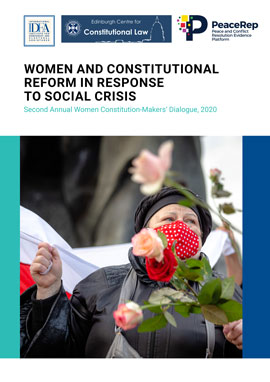Women and Constitutional Reform in Response to Social Crisis
There is a rise in social protests globally due to dissatisfaction with governance, and women and youth often lead these protests. Governments respond to social protests with different tactics and methods, and some may engage in constitutional change to address the social unrest. Constitutional reform in response to social unrest presents an opportunity for women to ensure to ensure that their substantive interests—articulated as part of a protest movement—are incorporated into subsequent constitutional reforms. But women's participation and influence must often be (re)asserted when protest movements transition into a constitution-building process, as women tend to be seen as agents of change but not as agents of governance.
The annual Women Constitution-Makers’ Dialogue series was established in 2019 as a platform for peer-to-peer exchange of experiences among women constitution-makers and peacebuilders. The second event in the series was held in November 2020, focusing on ‘Constitution-Making in Response to Social Unrest’. Constitution-makers, peacebuilders, and women’s equality advocates from Chile, The Gambia, Kenya, South Sudan, Sudan, Syria and Yemen discussed the differing roles that women play in interrelated social movements and constitution-making processes; the opportunities and obstacles women face in mainstreaming their inclusion and influence; and the ways in which women’s engagement (or exclusion) impacts the efficacy of a constitutional reform endeavour in addressing systemic problems underlying the civil unrest.
Co-published with Peace and Conflict Resolution Evidence Platform and the Edinburgh Centre for Constitutional Law.
